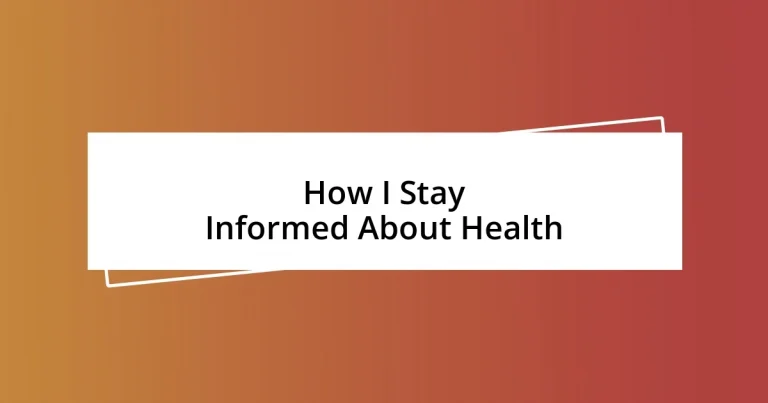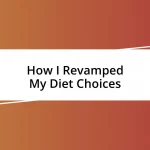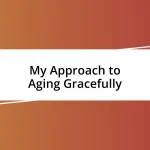Key takeaways:
- Verify the credibility of health information sources, prioritizing reputable organizations like the Mayo Clinic and the WHO to ensure scientifically backed advice.
- Utilize health apps effectively by setting clear goals, consistently updating data, and engaging with features, while remaining skeptical about their claims.
- Participate in online health communities and webinars to gain diverse insights, foster connections, and engage in discussions that enhance understanding and motivation for personal health journeys.
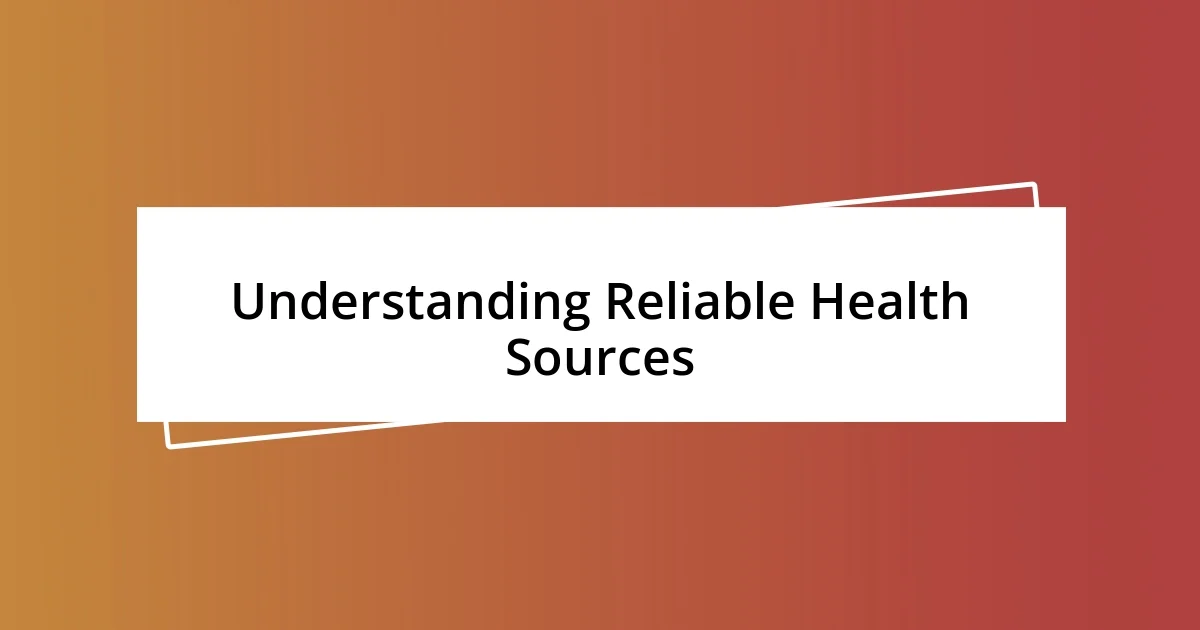
Understanding Reliable Health Sources
When it comes to health information, not all sources are created equal. I still remember a time when I stumbled upon a sensational article, claiming a miraculous cure for a common ailment. My heart raced with hope, but as I dug deeper, I realized it was from a questionable site. This experience highlighted the importance of checking the credibility of the source before I invest my time or emotions in what I’m reading.
I’ve learned that reputable health organizations—like the Mayo Clinic or the World Health Organization—are often the best places to start. Why? They base their information on rigorous scientific research and years of expertise. I tend to feel reassured knowing that the guidance comes from trusted professionals who prioritize public health over sensationalism. Isn’t it comforting to rely on resources that have a solid foundation?
Another key aspect is recognizing bias. I always ask myself: Who is behind the information? Understanding a source’s motivation can drastically change the context of what I’m reading. For instance, I once found an article promoting a specific supplement, only to discover it was written by the company selling it. This taught me to look for independent studies and diverse viewpoints, ensuring a well-rounded understanding of any health topic.
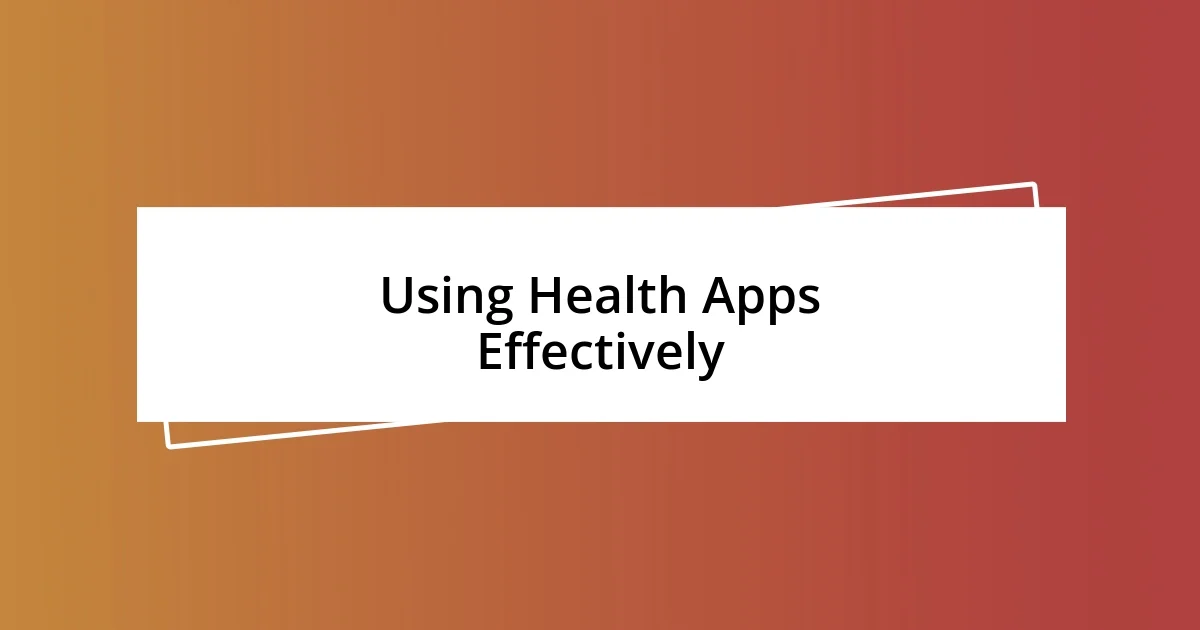
Using Health Apps Effectively
When I first started exploring health apps, I was overwhelmed by the sheer number available. My experience taught me that it’s essential to find apps that align with my specific health goals, whether that’s tracking my nutrition, managing stress, or monitoring physical activity. For example, I remember downloading a sleep app that turned out to be cluttered and confusing. I quickly realized that an intuitive interface is just as important as the app’s features.
Here are some tips to use health apps effectively:
- Set Clear Goals: Define what you want to achieve with the app—whether it’s losing weight, improving sleep quality, or increasing fitness levels.
- Regularly Update Information: Input your data consistently for the most accurate insights. I learned that irregular tracking makes it hard to see progress.
- Engage with Features: Don’t be afraid to explore—utilize reminders, goal-setting options, or educational content. I found that engaging with all aspects leads to more motivation.
- Stay Skeptical: Continuously evaluate the app’s usefulness and credibility. I once used an app that promised miraculous results, only to find it wasn’t based on solid evidence.
- Join Communities: Many apps offer forums or social features. Connecting with others can provide extra motivation and support, sharing experiences makes the journey feel less isolating.
Finding the right app is a journey in itself, but when you use them thoughtfully, they can become powerful allies in your health journey.
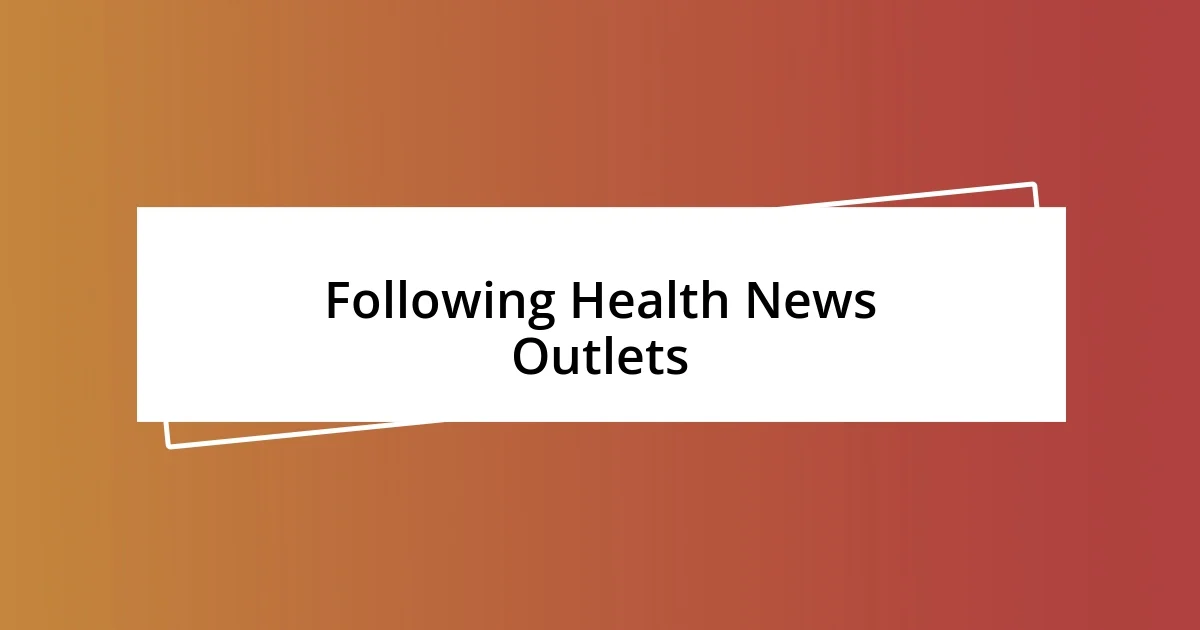
Following Health News Outlets
When it comes to following health news outlets, I find that reading a variety of sources is crucial. For instance, I often check platforms like CNN Health and Healthline. However, I learned the hard way that sensational headlines can sometimes overshadow the facts. Once, I read a headline about a new miracle diet that caught my attention, but after diving into the article, I discovered it was more hype than substance. Having learned from this experience, I now pay attention to reputable outlets that provide balanced reporting backed by scientific evidence.
I also appreciate health-focused newsletters that deliver articles directly to my inbox. These curated selections often highlight the latest research and trends, which helps me save time. I vividly remember subscribing to a weekly newsletter from a trusted hospital. The information I received was not only insightful but often sparked intriguing conversations with friends and family. It’s one of those habits that grew on me gradually; now, I eagerly await each weekly update because I love staying informed.
Lastly, participating in online health forums can offer real-time insights and discussions. I occasionally hop into such communities to get different perspectives on trending health topics. Once, I joined a discussion about the psychology of nutrition, which led to a fantastic exchange of personal stories and research. Engaging in these conversations helps me feel connected and informed, turning what could be a lonely journey into a rich tapestry of shared knowledge.
| Health News Outlets | Characteristics |
|---|---|
| CNN Health | General news coverage with a health section; often features trending health topics but can lean towards sensationalism. |
| Healthline | Offers practical health advice and is generally more conservative in its reporting; typically well-researched content. |
| Weekly Newsletters | Curated content depending on the source; saves time and often includes the latest studies or health recommendations. |
| Online Health Forums | Real-time discussions; provides a platform for sharing personal experiences and diverse viewpoints on health trends. |
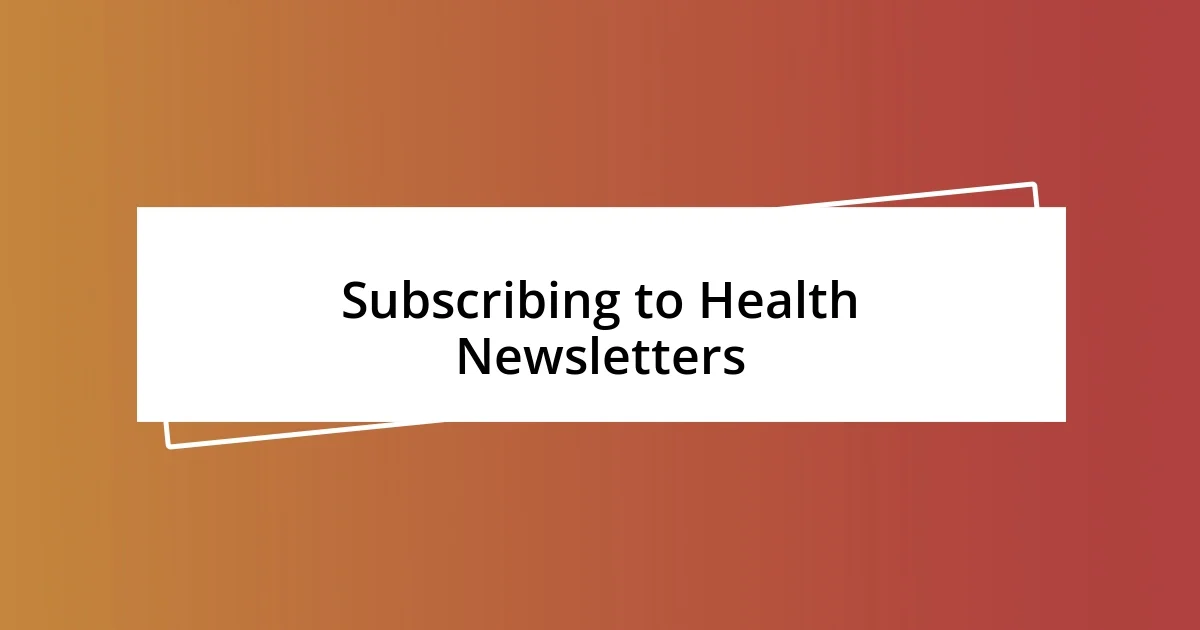
Subscribing to Health Newsletters
Subscribing to health newsletters has become an invaluable part of my routine. I recall the excitement of signing up for one from a leading health institution; the anticipation each week was almost like waiting for the next episode of my favorite series. The content was always rich with insights, from groundbreaking studies to practical tips, and it truly felt like I had the latest health research delivered right to my doorstep.
One thing I love about these newsletters is the sense of community they foster. I remember discussing an article about the benefits of mindfulness with my friends after a newsletter prompted my curiosity. It made me wonder—how many other people are having similar conversations sparked by the same source? The connection created by shared knowledge makes the experience of staying informed feel less solitary.
Moreover, the convenience factor cannot be underestimated. With a busy lifestyle, I found myself struggling to keep up with the wealth of information out there. Now, each newsletter is a carefully curated collection of valuable insights that saves me time and helps prioritize what matters most for my health. I appreciate how sometimes, just that little ‘ding’ of a new email reminds me to pause and reflect on my well-being, reinforcing my commitment to staying informed.
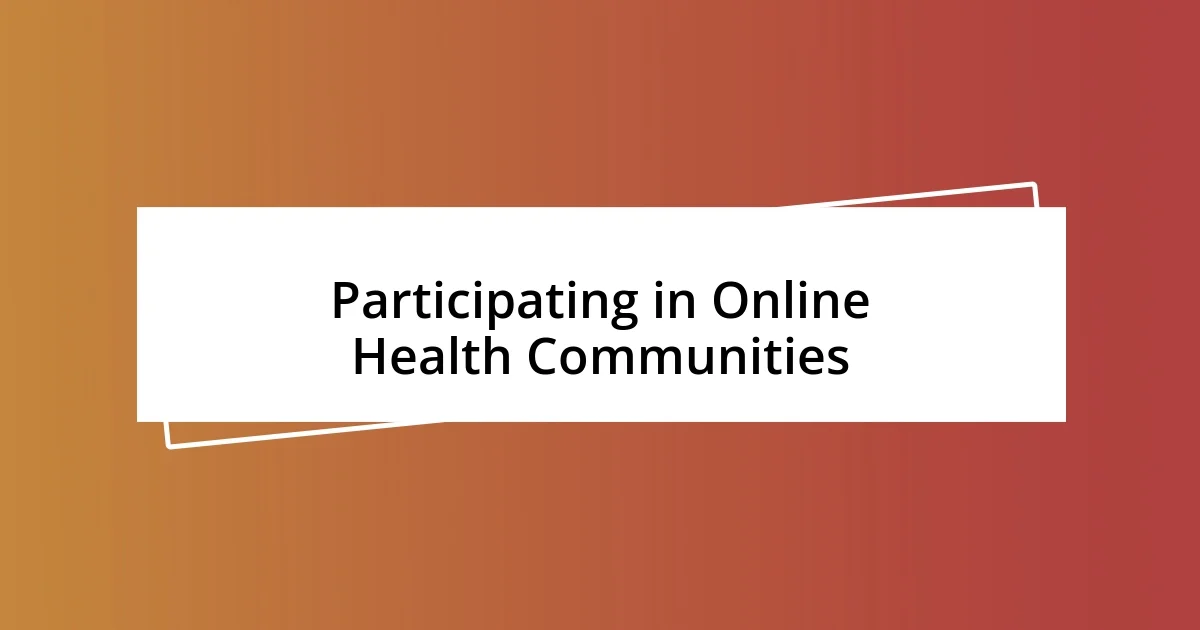
Participating in Online Health Communities
I’ve found that participating in online health communities is like being part of a virtual support group. One evening, I decided to join a Facebook group focused on healthy living. What surprised me was how open and vulnerable members were in sharing their experiences—some were triumphs, while others were struggles. It made me consider: how often do we hold back from expressing our health journeys? In that space, I felt motivated to share my personal struggles with meal prepping, and the responses were overwhelmingly supportive.
In addition to emotional support, these communities often serve as rich knowledge banks. I once took part in a thread discussing the latest trends in probiotics. It was fascinating to read personal success stories from various individuals who had tried different brands and formulations. Their testimonials provided insight that no article could offer. Have you ever encountered advice that was so impactful, you found yourself nodding along? I definitely have, and it’s those moments of realization that deepen my understanding of health beyond textbook definitions.
Engaging in these forums has also taught me to think critically about health information. During a lively debate on an emerging diet trend, I witnessed members dissect scientific studies, highlighting both pros and cons. It was like a mini seminar, with real-life applications. Moments like that made me wonder how important it is to analyze the information we consume, right? By being part of this community, I’ve craved more than just passive reading; I’ve learned to actively participate in discussions that shape my health perspective.
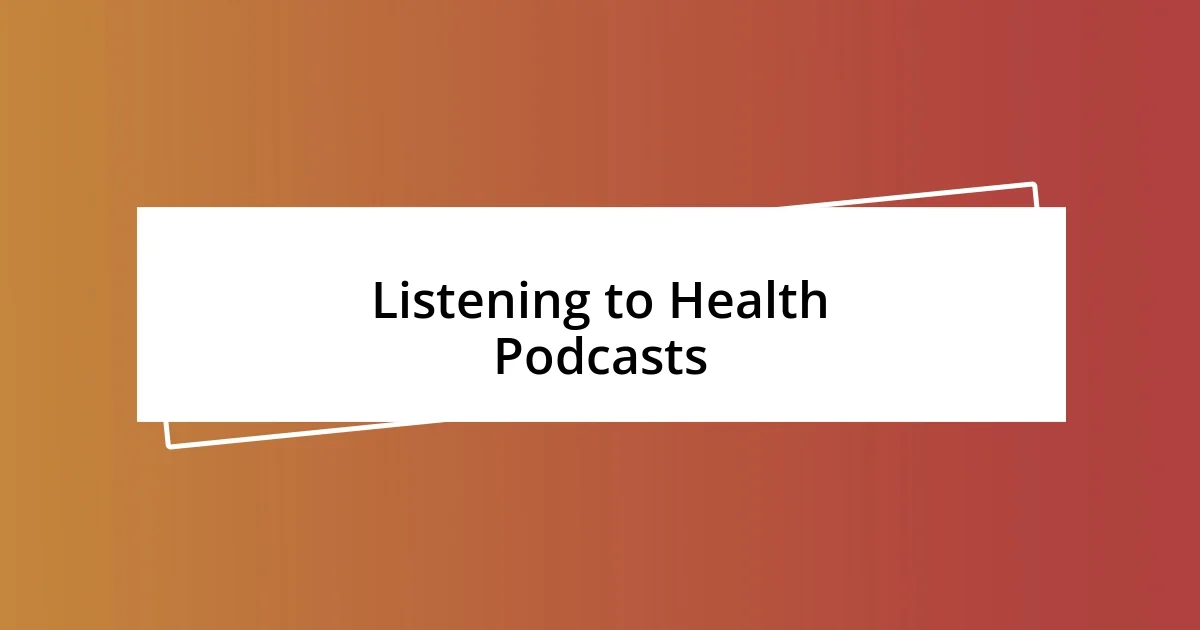
Listening to Health Podcasts
Listening to health podcasts has transformed how I consume health information. I remember the first time I tuned into a podcast while walking my dog; the host’s conversational tone felt like discussing health topics with a friend. That intimate experience not only kept me entertained but also immersed me in valuable insights about nutrition and wellness without feeling like I was burdened with another textbook.
What often strikes me is the variety of perspectives presented in these podcasts. One particular episode about mental health stuck with me for weeks; hearing a guest describe their journey through depression in such an honest and unfiltered way made it feel real. Have you ever heard something that resonated so deeply it prompted you to change your habits? I certainly did, and that reflection pushed me to prioritize my own mental well-being more actively.
Moreover, the convenience of podcasts fits seamlessly into my hectic schedule. Whether I’m cooking dinner or commuting, I can easily absorb expert advice and inspiring stories on the go. I find myself routinely pausing an episode to take notes or to share a particularly insightful tip with a friend. It’s incredible how a simple audio format can spark genuine discussions, don’t you think? With each episode, I feel like I’m investing time in my health, realizing that learning about wellness can be both enjoyable and enriching.
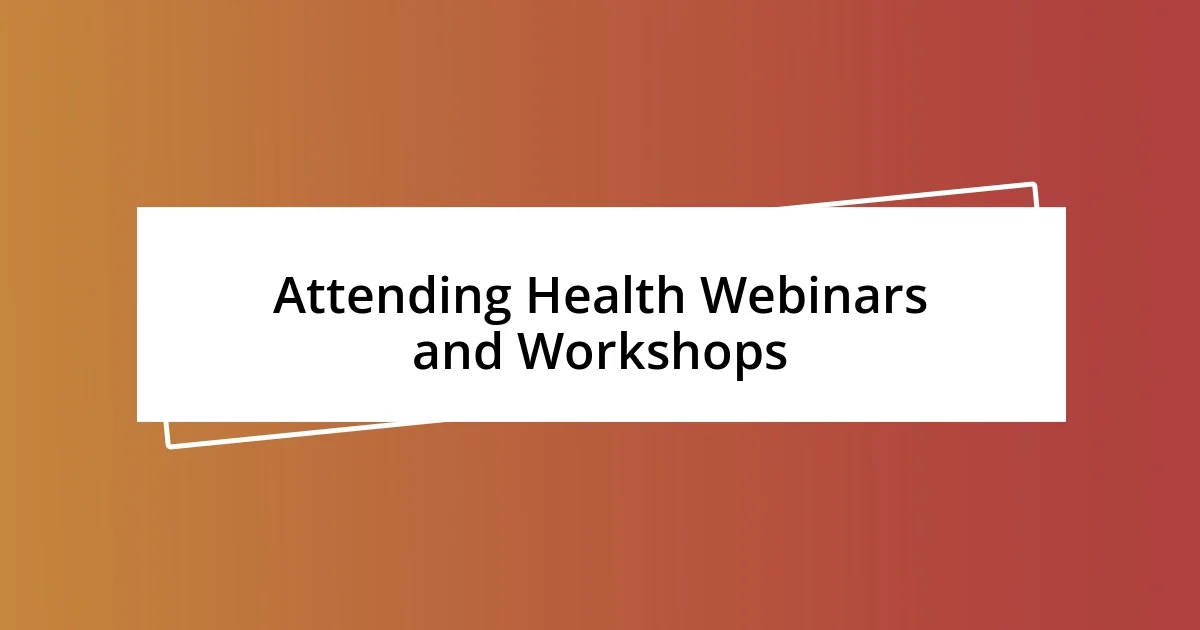
Attending Health Webinars and Workshops
Attending health webinars and workshops has opened new avenues for my understanding of wellness. I recall a virtual workshop I joined on holistic nutrition; the presenter had an incredible ability to break down complex concepts into digestible nuggets. It was fascinating to learn about how different foods impact our bodies, and I found myself nodding along as if I was in the same room, soaking up every word. Have you ever felt so engaged in a learning experience that you forgot about everything around you? That’s exactly how I felt, and it led me to try new recipes that I hadn’t considered before.
Participating in these events not only expands my knowledge but also connects me with like-minded individuals. After a webinar on stress management, I stayed in the chat longer than I intended, eagerly exchanging tips with other participants. One insightful comment about mindfulness techniques resonated with me; it inspired me to adopt a daily meditation practice. The collective enthusiasm in these sessions is palpable, reminding me of the power of community in fostering growth. Isn’t it refreshing to know there are others seeking the same health improvements?
What I particularly love about health workshops is the interactive element. During one session on physical fitness, there were breakout groups where we discussed our personal fitness journeys. Sharing my struggles with staying motivated felt cathartic, and hearing others’ stories of triumph and setback reassured me that I wasn’t alone in my journey. It’s incredible how vulnerability breeds connection, don’t you think? Each time I attend, I leave feeling more empowered and equipped to take charge of my health, as if I’ve gained new tools for my toolbox.











